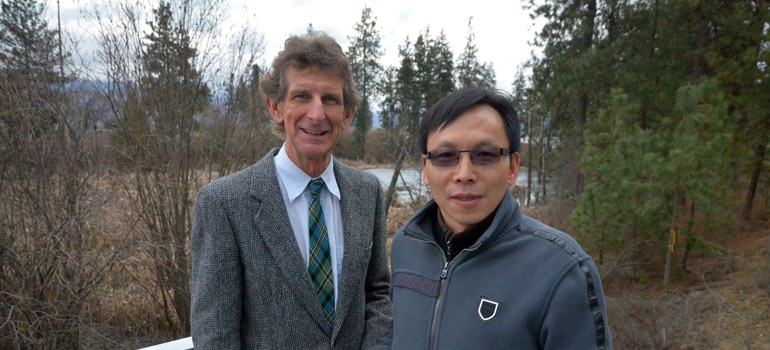
UBC scientists David F. Scott and Adam Wei are co-authors with the Chinese Academy of Sciences in a study that shows that changes in land cover play as significant a role as climate change on the hydrology of watersheds.
Climate change ruled out as most dominant factor for watersheds
A UBC-Chinese Academy of Sciences joint study shows that land cover plays as significant a role as climate change on the hydrology of watersheds.
Scientists Adam Wei and David F. Scott of UBC Okanagan’s Earth and Environmental Sciences Dept. in the Irving K. Barber School of Arts and Sciences are co-authors of a ground-breaking global study comparing climate change – often considered the main indicator of river flow – to the influence of land cover change, or a watershed’s ability to retain water.
Earlier research varies greatly, and the topic remains controversial in the scientific community. The two factors affecting water yield have often been investigated separately, but not in combination, particularly on a global scale.
The conclusions are dramatic, says Wei. “Climate is often viewed as dominant while land cover as secondary. This study suggests an important portion – 30 per cent – of the world where land cover plays a dominant or similar role.”
For instance, impacts of forest disturbance, urban growth or agriculture can severely affect the hydrological properties of a wetland or change the volumes and flows of a river, directly correlating to forest coverage, watershed slope and area. The results provide planning tools to predict how a specific ecosystem will react in becoming drier or wetter, based on land use.
“In many instances, we found that land cover and watershed condition play as important a role as climate change,” says Wei. The study shows that any land cover changes in non-humid regions or watersheds with low water-retention capacity have greater hydrological impact. The evidence indicates these global patterns have far-reaching significance in studying and managing watersheds.
The study, Global pattern for the effect of climate change and land cover on water yield, is published in the journal Nature Communications. Lead author of the study is Guoyi Zhou of the Chinese Academy of Sciences, with 10 co-authors.
View the study: http://www.nature.com/ncomms/2015/150109/ncomms6918/full/ncomms6918.html
UBC Okanagan is also organizing the 4th International Conference on Forests and Water in a Changing Environment on July 6 to 9, 2015. Check the conference website: www.forestandwater2015.com
—30—